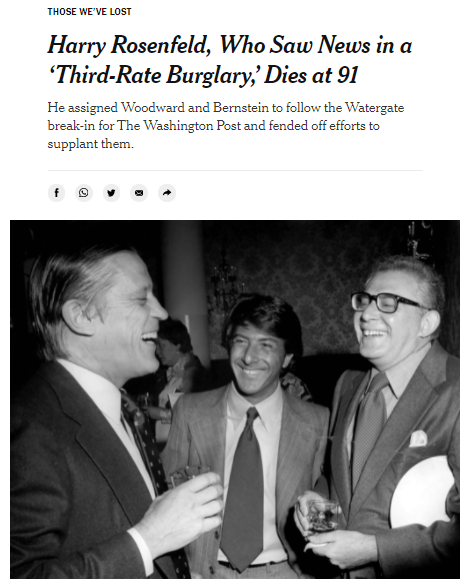The Media — Then and Now

Harry Rosenfeld (right), as remembered by The New York Times, with Ben Bradlee (left) and Dustin Hoffman (middle) in 1976.
Harry Rosenfeld's recent death prompts a discussion of the then and now in American journalism.
Harry who?
Think back to the award-winning film All the President's Men in which Jack Warden portrayed him. It was one of a number of excellent performances, including Robert Redford as Bob Woodward, Dustin Hoffman as Carl Bernstein, and Jason Robards as Ben Bradlee. The Washington Post stories resulted in the resignation of President Richard Nixon. If this doesn't ring a bell, stop reading. You won't get what's coming.
Rosenfeld was the assistant managing editor of The Washington Post who supervised young reporters Bob Woodward and Carl Bernstein when they stumbled on the Watergate story, which ranks among the best that American journalism has to offer in the last century. He supported his reporters when managing editor Ben Bradlee, realizing the magnitude of the story, wanted to replace them with more experienced reporters.
The Watergate scandal began in 1972, and here is the connection which relates to today. The event occurred not long after I interviewed Roger Ailes for Philadelphia magazine. Ailes was a communications advisor to President Nixon. He got that role after he coached Nixon in his winning presidential campaign of 1968. Ailes was prominent in Joe McGinniss' best-selling book, The Selling of the President 1968. He came across as very smart, very amusing, and very unscrupulous. Ailes was based in Philadelphia at the time. He was producer of Mike Douglas afternoon talk show. In our interview, Ailes defended his presentation of Nixon as fair and balanced. It wasn't. Press conferences were stacked with friendly reporters who asked only softball questions. It was contrived at every turn. Exposing that is what made McGinniss' book a sensation. Ailes did admit that he thought the media was biased in favor of Democrats, and said he'd like to see a Republican outlet to balance the three major networks. I barely mentioned it in the piece; it seemed so far-fetched. But two decades later, after he rose in television status, Ailes saw his opportunity in cable TV. He started Fox News and stayed as its head until forced out by a sex scandal in 2016.
When The Washington Post first went after President Nixon, it was alone. Other media, print and broadcast, largely ignored its stories. Eventually, however, as the evidence mounted over two years (tapes were discovered proving Nixon's heavy involvement), the rest of the journalism world joined in. Prominent Republican politicians sealed his fate when they came to believe that using CIA operatives to spy on Democrats, and then lying to cover it up, was a very serious matter. Men like Republican Senator Howard Baker of Tennessee, Democratic Senator Sam Ervin of North Carolina, and Republican Attorney General Elliot Richardson put their reputations on the line by respecting the Post's reporting. Richardson resigned rather than obey Nixon's order that he fire the lead Watergate prosecutor. Ultimately there was little support for Nixon among his own Republican colleagues.
But imagine if now were then, and Ailes had launched Fox News in 1972. Suppose, for two years, it brought on guests, including elected officials, to say Watergate was a hoax and a plot to get Nixon. And every time a negative Nixon story broke, the network switched the subject to President Kennedy having chased girls or the seemingly endless Vietnam War or some other "false equivalency." Suppose this network did not cover Watergate at all, or only when it figured out a slant that defended the president and made a large number of Americans believe that there was nothing wrong with using the CIA to spy on political opponents, and lying about it under oath. Suppose men like Baker, Ervin, and Richardson said nothing, or voted not to pursue the matter in any way. And suppose their silence was applauded at every opportunity by a well-watched network.
The difference between then and now is media treatment, and a Congress filled with Republicans who would throw men like Baker and Richardson out of the party. And attack Harry Rosenfeld and his newspaper as enemies of the people.
It should be noted that Nixon’s transgressions, so shocking then, now seem like venial sins compared to the gravity of trying to overthrow a presidential election and helping incite an attack on the U.S. Capitol.
Congratulations Harry Rosenfeld and The Washington Post for your journalistic courage. And also recognition to Roger Ailes for proving that the evil men do lives after them.
